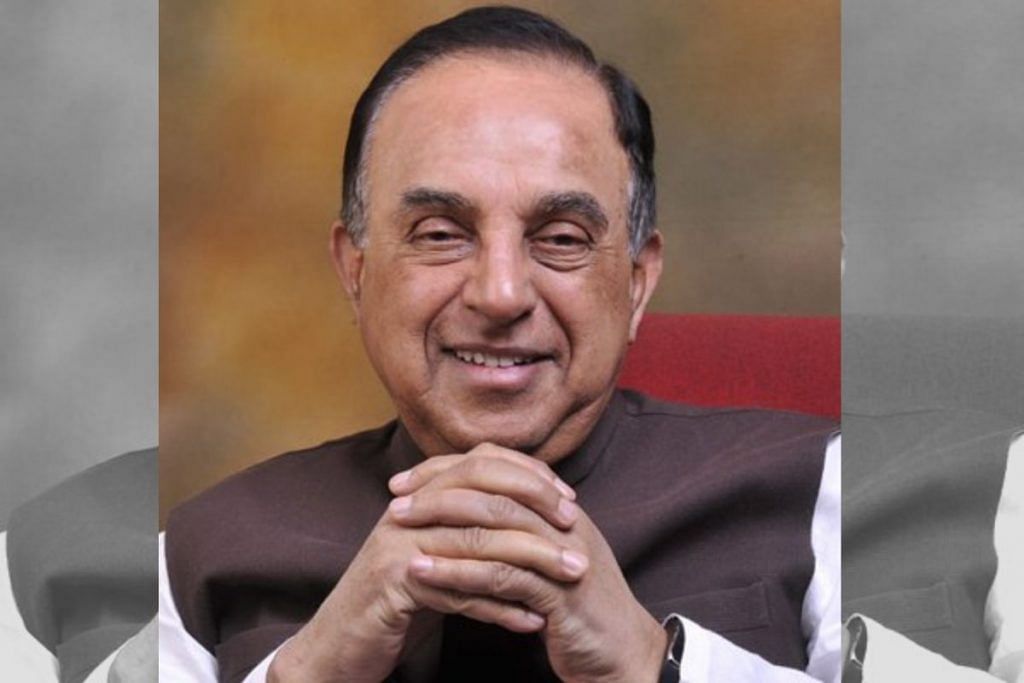New Delhi: Rajya Sabha MP and BJP leader Subramanian Swamy has now taken up the task to “reclaim Kashi Vishwanath” temple in Varanasi — one of the three “Hindu sites” that Right-wing organisations claimed during the Ram temple movement.
On Saturday, Swamy took to Twitter to reiterate that a panel of seers has been formed with him as chairman to “liberate the site after recovering the Jyotirling removed by Aurangzeb”. He had spoken about the panel in May.
— Subramanian Swamy (@Swamy39) September 13, 2020
In his tweet, Swamy said he welcomed the “honour and responsibility”. He retweeted a number of posts in support of the cause he has taken up.
We owe him a lot.
Undoubtedly, he will succeed.If vested interests are kept out, he may even reason with and persuade Waqf Boards to settle this matter across India once and for all.
All power to Dr.Swamy ji.— vikas (@vikas6th) September 13, 2020
Great Visionary, Dr. @Swamy39 ji’s next focus is the liberation and restoration of Kashi Vishwanath Temple !!??
'Kashi Vishwanath Next Focus' – Dr. @Swamy39 jee on #NewsX
हर हर महादेव || ?? https://t.co/NoensgqUct
— सरिता राजपूत (@SaritaRajput6) September 13, 2020
The movement for the temple is being sought despite a law that bars forcible changes to the religious character of places of worship across the country.
In its Ayodhya judgment last year, the Supreme Court had invoked the Places of Worship (Special Provisions) Act of 1991 to caution everyone against forcibly converting the religious character of places of worship across the country. It said the Act “speaks to the future by mandating that the character of a place of public worship shall not be altered”.
Also read: Sabarimala Temple to open on 16 November, doctors say only Kerala residents be allowed
The temples issue
In 1984, Right-wing organisations such as the RSS-affiliated Vishva Hindu Parishad raised the matter of reconstruction of Hindu temples at Ayodhya, Mathura and Kashi (Varanasi) for the first time.
During the Ram Janmabhoomi movement, the VHP raised the slogan “Ayodhya-Babri sirf jhaanki hai, Kashi-Mathura baaki hai (Ayodhya-Babri is just the start, Varanasi and Mathura are still left)”.
The Kashi Vishwanath temple shares a boundary wall with the Gyanvapi mosque, while the Shahi Idgah in Mathura is adjacent to the Krishna Janmabhoomi temple complex.
Earlier this week, Hindu seers also revived the demand for the removal of mosques from “holy sites” in Kashi (Varanasi) and Mathura, pushing the RSS to rethink its decision not to get involved in any Ayodhya-like movement in the future.
The Akhil Bharatiya Akhada Parishad (ABAP), an apex body of 14 akhadas or organisations of saints and seers, passed a resolution in Prayagraj to “liberate Kashi and Mathura” by removing the two mosques. It sought the support of the RSS and VHP, which had launched the Ram Janmabhoomi movement in the 1980s.
In May, Swamy had spoken on the Kashi Vishwanath matter saying he would take it up after the lockdown is lifted.
Kashi Vishvanath Temple will be taken up after Lockdown is over. A Committee of prominent Sadhus has been formed with Jagadguru Jr. Shankaracharya Jitendra Swamiji as Gen Secy and myself as Chairman to liberate the site after recovering the Jyotirling removed by Aurangzeb
— Subramanian Swamy (@Swamy39) May 23, 2020
Earlier in March, Swamy had said, “Liberation and restoration of the Kashi Vishwanath Jyotirling Mandir is a fundamental part of Hindu Renaissance. I hope the Muslim community will cooperate with us Hindus on this and help us restore the temple.”
Liberation and restoration of the Kashi Vishwanath Jyotirling Mandir is a fundamental part of Hindu Renaissance. I hope the Muslim community will cooperate with us Hindus on this and help us restore the temple
— Subramanian Swamy (@Swamy39) March 5, 2020
SC on places of worship law
In its November 2019 judgment on the Ram Janmabhoomi issue, the Supreme Court invoked the Places of Worship (Special Provisions) Act of 1991, which prohibits the conversion of any religious place of worship as it existed at the time of Independence.
The law was enacted by the P.V. Narasimha Rao government in 1991, over a year before the Babri mosque was demolished in Ayodhya.
In its judgment, the apex court cited the essence of the Act to rebuke the fundamentalists who sought to avenge the excesses of invaders to tear down the 16th-century mosque on 6 December 1992.
Also read: Rs 6 lakh stolen from Ayodhya’s Ram Mandir trust through two fake cheques
